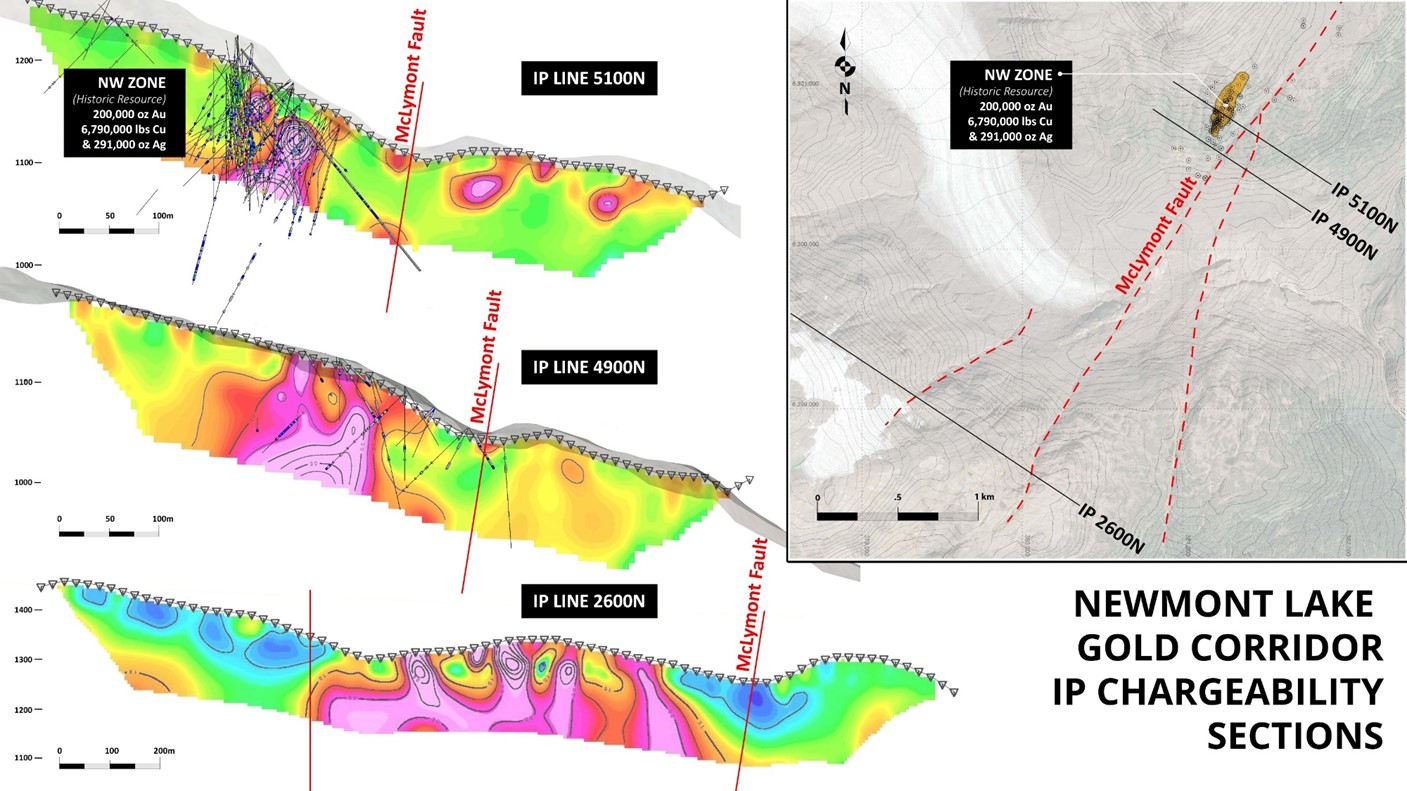September 10, 2019, Vancouver, British Columbia – Crystal Lake Mining Corporation (TSXV: CLM OTC: SIOCF FSE: SOG-FF) (“Crystal Lake” or the “Company”) is pleased to provide an update on exploration designed to test the Newmont Lake corridor for high grade gold mineralization on the Company’s roughly 700 km2 Newmont Lake Project in the heart of BC’s Golden Triangle. The Newmont Lake corridor contains the historic Newmont Lake gold mineral resource, which sits at the western flank of the strongly endowed Eskay Rift. Geological work has established potential for the known deposit to be open along strike. A thorough review of historic drill core, assaying of previously untested drill core, and construction of a 3D model underpins a new understanding of the deposit and has provided a number of targets along strike from the historic resource where potential extensions or new mineral zones may exist.
High-Grade Gold Targets in the Newmont Lake Gold Corridor
Assay results from an extensive program of surface mapping and geochemistry of rock chip samples and previously unsampled core have shown that high grade gold mineralization follows the trend of the McLymont Fault Zone (please see the Company’s News Release dated September 4th, 2019) over a strike length of >8kms centered along the trend of the Newmont Lake resource.
Multiple boulders containing high grade gold mineralization with up to 84.4 g/tonne gold have been traced back to a new target in the Arseno Zone. The boulders are selected samples that are not in situ, the source of these samples is not known and is not necessarily indicative of mineralization hosted on the property. Similar mineralization in outcrop has been traced back to a possible source which is interpreted to be covered by ice. This target is a step-out along trend from the historic Newmont Lake deposit, and drilling is being guided by a combination of outcropping mineralization, alteration, and chargeability response in the IP survey.


Plan View of the Newmont Lake Gold Corridor between NW Zone and Arseno showing locations of IP lines, and the location of the historic NW Zone resource. Historic and 2019 assays are collected from multiple historic boulder samples inferred to be locally sourced. The boulders are selected samples that are not in situ, the source of these samples is not known and is not necessarily indicative of mineralization hosted on the property.
The first 3 drill holes at the NW Zone tested the northern portion in the footprint of the historic inferred resource that contains 1,406k tonnes at an average grade of 4.43 g/t Au, 0.22% Cu and 6.4 g/t Ag at a projected “base case” cut-off grade of 2 g/t Au containing 200,000 oz Au, 6.79 million lbs of copper and 291,000 oz of silver (Mineral Resource Estimate on the North West Zone, Newmont Lake Property, submitted to Romios Gold Resource Inc., May 11, 2007). This resource estimate was based solely on the drill hole data collected by Gulf Minerals in the late 1980’s and early 1990’s. The objective of the initial drilling is to better understand the geological controls on mineralization and evaluate whether historic sampling adequately reflects the grade. Drilling beyond the northern and southern trend of the historic resource is designed to identify extensions of mineralization based on the newly developed geological model. The drill targets have been constrained based on the geological data together with the trend of mineralization and the chargeability response from the 2019 IP survey.
The mineral estimate cited above is presented as a historical estimate and uses historical terminology which does not conform to current NI 43-101 standards. A qualified person has not done sufficient work to classify the historical estimate as current mineral resources or mineral reserves. Although the historical estimates are believed to be based on reasonable assumptions, they were calculated prior to the implementation of National Instrument 43-101. These historical estimates do not meet current standards as defined under sections 1.2 and 1.3 of NI 43-101; consequently, the issuer is not treating the historical estimate as current mineral resources or mineral reserves.


Stacked IP inversions of reinverted historic IP data from the NW Zone (IP Lines 5100N and 4900N) and 2019 IP lines from the Arseno Zone (IP line 2600N). IP section locations depicted on inset map.
Crystal Lake Expands the Newmont Lake Project
Crystal Lake has staked an additional 5,423 hectares of claims contiguous with the Newmont Lake and Foremore Claims Properties. The total land package now comprises a total 728km2 (72,800 hectares), which makes Crystal Lake the holder of one of the largest and most prospective projects within the Eskay Camp.
Maurizio Napoli P. Geo., VP Exploration of Crystal Lake commented “Our 2019 exploration program has indicated that the McLymont Fault running through the centre of our Project is an important control of the high-grade gold mineralization in the historic resource of 200,000 ounces completed in 2006. Our sampling campaign of historic drill core that had not been previously assayed has demonstrated that there are unsampled gold bearing intervals within the resource volume implying that a significant amount of gold, silver and copper values may be under-reported within the area of the historic resource. The objective of our current drilling campaign is to expand the current resource and, to discover new high-grade gold zones along the McLymont Fault.”


Crystal Lake’s land package in the Eskay Camp including the newly conjoined Newmont Lake and Foremore properties.
Qualified Person
The technical information in this news release has been reviewed and approved by Mr. Maurizio Napoli, P. Geo., VP Exploration for Crystal Lake Mining, a Qualified Person responsible for the scientific and technical information contained herein under National Instrument 43-101 standards.
Quality Assurance/Quality Control
Rock samples from the Northwest Gold Zone were sent to MSA Labs’ preparation facility in Terrace, B.C., where samples were prepared using method PRP-910. Samples were dried, crushed to 2mm, split 250g and pulverized to 85% passing 75 microns. Prepped samples were sent to MSA Labs’ analytical facility in Langley, B.C, where they were analyzed for gold using method FAS-121 (fire assay-AAS finish). Gold assays greater than 100 g/t Au were automatically analyzed using FAS-425 (fire assay with a gravimetric finish). Rock samples were analyzed for 53 elements using method IMS-230, multi-element ICP-MS 4-acid digestion, ultra-trace level. Silver assay results greater than 100 g/t Ag and cobalt, copper, nickel, lead and zinc greater than 10,000ppm were automatically analyzed by ore grade method ICF-6.
Crystal Lake Mining conducts its own QA/QC program where three standard reference material pulps, two blank reference material samples are inserted for every 100 samples when analyzing rock samples.
About Crystal Lake Mining
Crystal Lake Mining is a Canadian-based junior exploration company focused on building shareholder value through high-grade discovery opportunities in British Columbia and Ontario. The Company has an option to earn a 100% interest in the Newmont Lake Project, one of the largest land packages among juniors in the broader Eskay region in the heart of Northwest B.C.’s Golden Triangle.
On Behalf of the Board of Directors,
CRYSTAL LAKE MINING CORP.
“Richard Savage”
President & CEO
Email: info@crystallakemining.com
For further information please contact:
MarketSmart Communications
Tel: +1 (604) 261-4466
Toll Free: +1 (877) 261-4466
Email: info@marketsmart.ca
Momentum Public Relations
Tel: +1 (514) 815-7473
Email: mark@momentumpr.com

